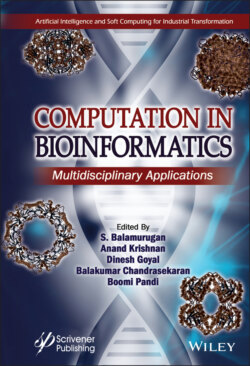Читать книгу Computation in BioInformatics - Группа авторов - Страница 19
1.2.5 Molecular Docking
ОглавлениеMolecular docking is a computer simulation methodology which predicts the binding affinity of the target protein with the ligand at the atomistic level. The most important goal of molecular docking studies is to predict the binding conformation of protein-ligand and to estimate its interaction. It is also one of the main tools for virtual screening procedures, where a library of several compounds is “docked” against one drug target returning the best hit. Identifying the active site of the target protein where the ligand will bind is the first important step which needs to be performed before docking. This can be performed using programs like Q-SiteFinder, LigA Site, Meta Pocket, and CASTp [32]. A molecular docking study where the process of docking is performed without predicting the active site is referred as “Blind Docking” [33]. Here, Tables 1.2 and 1.3 show some of the most common Molecular docking software programs along with their specifications.
AutoDock: It is an automated program to predict ligand and protein (bio-macromolecular targets) interactions. With recent advancement in bimolecular, X-ray crystallography is helping to provide structural information of complex bio-molecules such as protein and nucleic acids. The structures can be taken/downloaded and can be used as targets for new drug molecules in controlling diseases and disorders of human, animal, and plant and understanding of fundamental aspects of biology [41]. It can be downloaded from http://www.scripps.edu/olson/forli/autodock_flex_rings.html (accessed 12.12.16).
GOLD: Genetic Optimization for Ligand Docking is a genetic algorithm which provides docking of flexible ligand and a protein with flexible hydroxyl groups. The software uses a scoring function that is based on favorable conformations found in Cambridge Structural Database. The speed of GOLD and the reliability of its predictions depend on the control of different values of the genetic algorithm parameters. It provides reliable results both protein and ligand (http://www.ccdc.cam.ac.uk/Solutions/GoldSuite/Pages/GOLD.aspx) (accessed 20.12.16).
Table 1.2 The list of molecular docking softwares is represented in tabular form.
| S. no. | Name of software | Description | Reference |
| 1 | AutoDock | It performs automated docking of flexible ligands to macromolecules. | [34] |
| 2 | DockVision | It performs Monte Carlo, Genetic Algorithm, and database screening docking algorithms. | [35, 36] |
| 3 | GOLD | It helps in identifying correct binding modes of the active target molecules. | [37] |
| 4 | Docking Server | It provides a web-based interface for the molecular docking of protein and ligand. | [38] |
| 5 | SwissDock | It is a protein ligand server that is accessed through ExPASy. | [39] |
| 6 | CombiBUILD | It is a structure-based drug design program which helps in designing of combinatorial libraries. | [37] |
| 7 | QM Polarized Ligand Docking | It performs the function of both Glide and Q-Site applications of Schrodinger Suit. | [40] |
| 8 | Docking Server | It provides a web-based, easy to use interface for the molecular docking of protein and ligand. | [34] |
| 10 | Click2Drug | It is a protein ligand server that is accessed through ExPASy. | http://www.click2drug.org/ |
Table 1.3 The list of molecular docking tools is represented in tabular form.
| Tool | Brief description with uses |
| BLAST | Basic local alignment search tool; used for sequencing of DNA and protein. |
| RasMol | Raster molecule tool; used for molecular visualization of RNA/DNA and protein. |
| Discovery studio | Software; used for modeling and simulation. |
| Pub Med | Free search engine; used for searching matter related to medical and life sciences. |
| PDB | Protein Data Bank; used to collect information related to macromolecule. |
| Chem Draw | They are a part of the Chem office program which are used for drawing chemical molecule. |
| Marvin Sketch | These are advanced chemical editors that are used for drawing chemical structures and reactions. |
| PubChem | Database; used to collect information about structure and physiochemical properties of chemical compound. |
| AutoDock | Software; used for molecular docking. |
